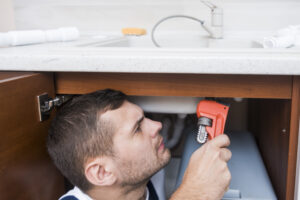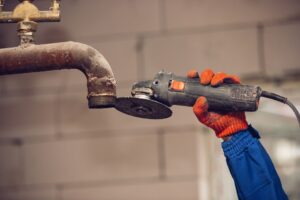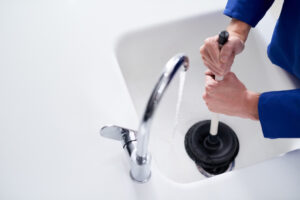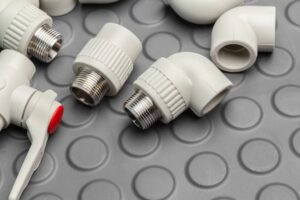Why My Water Heater Is Leaking?
Water heater leaks can cause extensive structural damage to your home. So it’s important to address the leak as soon as possible to prevent further damage or flooding to your home.
If you suspect a problem with your water heater leaking or are unsure about the cause of the leaking water heater, it is best to call a professional plumber for inspection and repair. Below, we look at some possible reasons why your water leaking is leaking from the bottom.
Corrosion
If the water heater is leaking due to corrosion, it is likely that the water heater’s tank is corroded and can no longer hold water. Corrosion can happen over time due to a number of factors, including exposure to the elements, hard water, and high temperatures. Inspect the tank of the water heater for signs of corrosion, rust, or damage. If the corrosion is severe and the water heater is leaking, it may be necessary to replace the entire unit. If you suspect the water heater tank is corroded, it is best to call a professional plumber for an inspection. The plumber will likely advise on replacement options if corrosion is the issue.Loose Connections
Loose fittings or connections between the water heater and the water supply and drain lines may cause the water heater leak. Inspect the water supply and drain lines for any loose fittings or connections. Tighten any loose fittings or connections with pipe wrenches or pliers, being careful not to overtighten or damage the pipes or fittings. Turn the water supply back on and check for any leaks or damage. By tightening loose connections, you can prevent leaks and ensure that the water heater is securely connected to the water supply and drain lines. If you are uncomfortable performing this task or if the problem persists, it is best to call a professional plumber for assistance. Make sure to turn off the power or gas supply to the unit, and if possible, the water supply, too, before any inspection or repair work is done.Overheating
Overheating and leaking may be caused by a problem with the temperature and pressure relief valve (T&P valve). The T&P valve is a safety feature that is designed to release water and pressure if the temperature or pressure inside the water heater becomes too high. If this valve is faulty or not working properly, it can allow water to leak from the tank. Additionally, if the temperature is set too high on the thermostat, it can cause the water heater to overheat and eventually release water from the T&P valve. Here are some steps you can take if your water heater is overheating and leaking:- Turn off the power or gas supply to the unit if it is an electric or gas water heater respectively. If possible, turn off the water supply to the unit as well.
- Allow the water to cool down before attempting to inspect the unit.
- Inspect the T&P valve to make sure it is not clogged or blocked.
- Check the thermostat’s temperature setting and ensure it is set correctly.
- Check for any leaks or damages on the water heater, and look for any signs of corrosion or rust.





